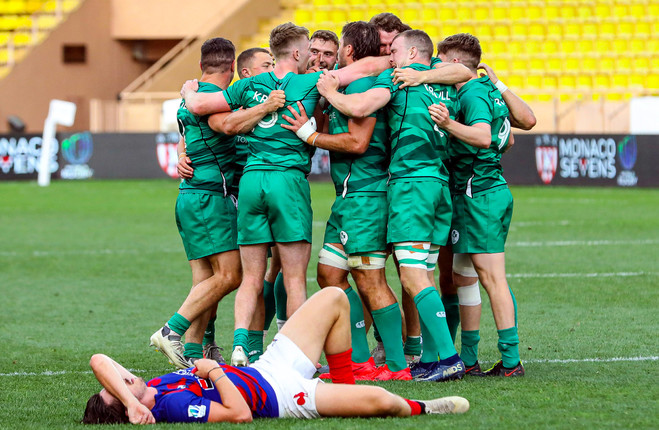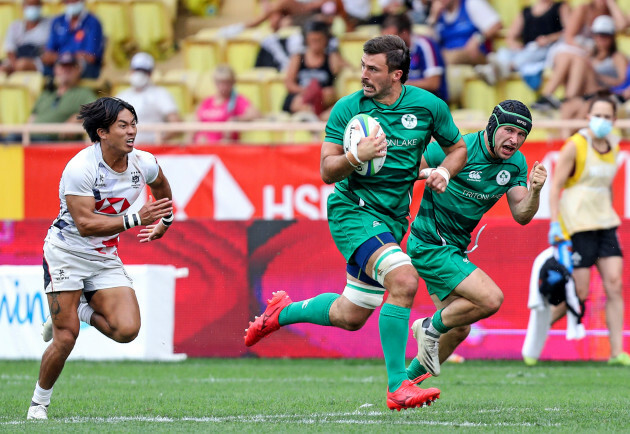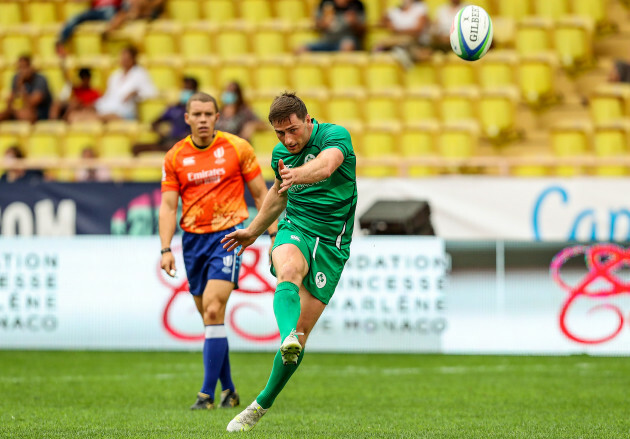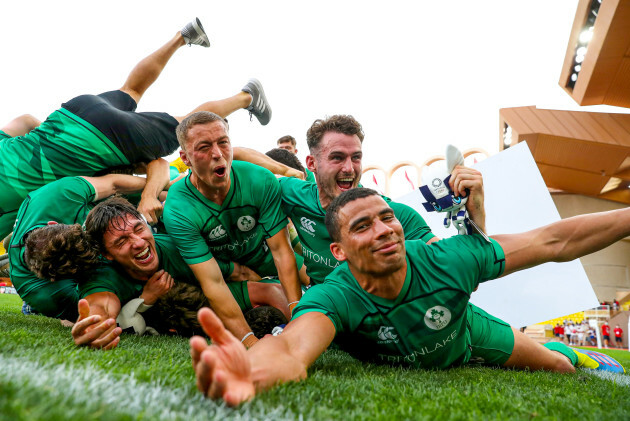NESTLED ON THE shores of the river Bosna in the little city of Zenica in Bosnia and Herzegovina, the Stadion Kamberovića polje isn’t the most glamorous rugby venue in the world.
It’s certainly nothing like the Tokyo Stadium where the Ireland men’s 7s team will play next month at the Olympics, having secured their place in thrilling fashion yesterday.
But the Stadion Kamberovića polje is where the journey started for Ireland in Rugby Europe Division C back in 2015 after the IRFU had finally relaunched its men’s 7s programme.
The union had been disinterested for years, with campaigners like former 7s international Cian Aherne left exasperated until new performance director David Nucifora landed from Australia in 2014 with big plans for 7s rugby, which was about to become a lot sexier due to it being an Olympic sport for the first time in 2016.
Nucifora hired another Aussie, Anthony Eddy, as the new director of 7s rugby and after a series of talent identification days, they named Ireland’s first men’s sevens squad.
Included in that squad were Harry McNulty, Ian Fitzpatrick, Foster Horan, Terry Kennedy, and Mark Roche – all of whom were in Monaco yesterday as Ireland pulled off Olympic qualification six years on from their first competition together.
McNulty scored a try against Turkey in what was Ireland’s first game back in 2015, making it all the more fitting that it was his score against France yesterday that sealed their spot in Tokyo.
Unsurprisingly, Ireland hammered everyone in Bosnia and Herzegovina that summer, rising rapidly through the European ranks to earn a shot at qualifying for the 2016 Olympics.
Ireland lost in the quarter-finals of the repechage in Monaco with a squad that included Billy Dardis, the man who captained them to yesterday’s success at the same venue. Dardis’ post-match interview beautifully encapsulated the journey and the achievement, while his unerring accuracy in kicking and passing was vital on the pitch.
McNulty and Fitzpatrick were there in 2016 too, when Ireland were real outsiders to qualify for the Rio Games but nonetheless had to deal with the agony of coming up short.
Their improvement continued, however, as Ireland won the Rugby Europe Grand Prix Series, came ninth at the World Cup in San Francisco, and had a stunning third-place finish at the London Sevens as an invitational team – a moment that marked them out to leading 7s nations as ones to watch.
There was major heartbreak in 2018 too, as Ireland lost to the hosts in agonising circumstances in the semi-finals of the Hong Kong Qualifier tournament, meaning they missed out on a place on the World Sevens Series. They had to wait another year to put that right, securing their place on the Series for 2019/20.
Jordan Conroy, who first played for Ireland 7s in 2016, proceeded to confirm his place as a genuine star of the game by being the top try-scorer on the Series with 23 tries in Ireland’s first season back on the circuit.
Ireland have had a hefty turnover of players over the last few years, with current 15s stars like Hugo Keenan, Shane Daly, Robert Baloucoune, and Jimmy O’Brien excelling during their stints with Eddy and Stan McDowell’s squad.
Recent Ireland 15s call-up Tom Daly was the 7s captain in Zenica back in 2015, with Leinster’s Adam Byrne and Munster’s Alex Wootton also part of the squad.
The likes of Will Connors, Nick Timoney, Rory O’Loughlin, Cormac Izuchukwu, and Dan Goggin have also passed through the programme but the really interesting 7s internationals are the ‘originals’ and the stalwarts like Dardis.
The squad in Monaco last weekend included just one player who is currently provincially contracted in Ulster flyer Aaron Sexton. The rest are players who were released by the provinces or never even contracted in the first place.
Jack Kelly couldn’t quite make the breakthrough at Leinster. McNulty was previously in the Munster academy. Horan couldn’t get into his native Leinster, Fitzpatrick was released from their academy.
Adam Leavy had a spell with the Connacht academy, as did Conroy. Dardis came through at Leinster but never got a senior shot. Suttonians man Sean Cribbin and Hugo Lennox of Skerries haven’t been contracted by an academy.
Greg O’Shea was a Munster academy man held back by injuries, Terry Kennedy let go by Leinster. Mark Roche earned his place by impressing with Lansdowne, Bryan Mollen by doing the same with Trinity. Gavin Mullin, released by Leinster after the academy, was unlucky to miss out on Monaco through injury.
These are all young men who have had to deal with the setback of being let go or never picked up by the provinces. 7s rugby gave them a new outlet, although it came with some sacrifice.
These Ireland players have been training as full-time professionals but the IRFU’s 7s contracts haven’t quite matched that status, being capped at €18,000 per season along with bonuses – nowhere near what a 15-a-side pro would expect to earn.
That said, the IRFU’s spend on 7s rugby had been on the rise before the pandemic, from just over €480,000 in the 2017/18 season all the way up to more than €1.1 million in 2019/20 [the figures account for the men and women's programmes]. Some of that money has gone into S&C, sports science, and analysis.
With a boost in profile to come with competing at the Olympics, 7s players might be hopeful of increasing their earning power in the future. But with just over a month to go until the tournament in Tokyo – set to take place from 27 to 29 July – there is an immediate next goal in front of them.
Fiji, the US, New Zealand and South Africa will be fancied as the leading contenders but Eddy’s settled Ireland squad will travel to Japan with medal ambitions.
They’re sure to pick up plenty of the neutral support if last weekend is anything to judge by.
This squad’s journey since 2015 has often been played out away from the limelight, with momentary bursts of wider support, but competing in the Olympics will ensure a whole new level of interest in Irish 7s rugby.




